Shall we install the security check system in hospital?
The Chen Zhongwei incident of Guangdong Provincial People's Hospital in May 2018, the kidnapping of nurses in Jixi in July 2017, the killing of doctors in Wenling in 2013, the killing of doctors in Harbin Medical Hospital in 2012...
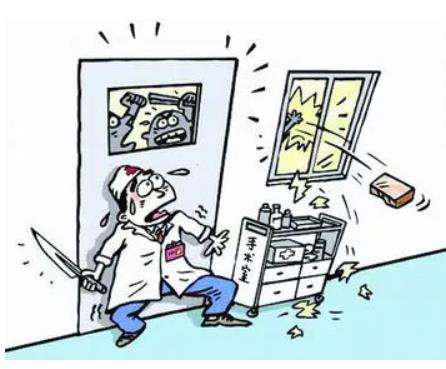
In recent years, incidents of wounding and killing doctors in the medical circle have become more frequent and intensified. They have ignited the anger of medical staff and medical groups across the country.
If we installed a security check system like security metal detectors and screening x ray machine at the entrance of the hospital, will these tragedies not happen?
In 2017, the medical bank survey conducted a survey of 740 medical workers and found that 55.1% of medical workers believe that it is very necessary for the hospital to set up security checks to ensure the safety of medical staff. 36.3% of medical workers believe that the establishment of security inspections will not cure the symptoms but not the root cause. A small number of people think that there is no need to set up security checks, which will only increase the problem of "difficulty in seeing a doctor".
The People's Liberation Army 301 Hospital is patrolled by armed police and security guards are equipped with police dogs. Naturally, medical disturbances are unlikely to occur in such a secure environment. Therefore, setting up a security check at the entrance of the hospital can ensure the personal safety of medical staff to a large extent.
It is reported that 40% of emergency rooms in the United States are equipped with metal detection equipment. Studies have shown that the use of metal detectors can reduce the incidence of violence in emergency rooms to 1/26 of the original.
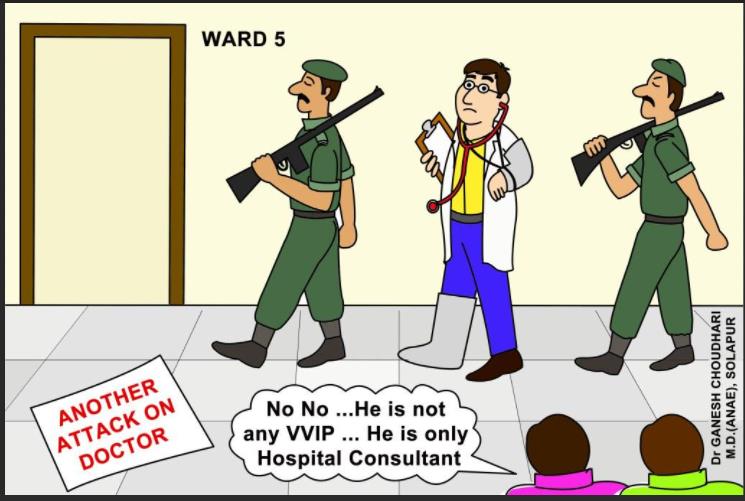
Violent wounded doctors not only make the doctors heartbroken but also make the public hate. Witnessing the efforts of medical staff during the epidemic, the voice of protecting medical staff has become stronger. Beijing took the lead, and the newly adopted "Beijing Hospital Safety and Order Management Regulations" will be implemented on July 1, clarifying seven categories of strictly prohibited violations of medical personnel safety and disturbance, including assault and injury of medical staff, carrying knives, and gathering quarrel The safe and orderly behavior of the hospital. At the same time, it is stipulated that the hospital will establish a security inspection system, and medical staff can suspend diagnosis and treatment when threatened by violence.
Do you know what the first thing many people do after seeing this news? It was after the news and told him: Doctor Tao, take a look, the doctors will be safer in the future. Last year, Dr. Tao Yong was chopped down in a pool of blood by a patient he had treated. He was chopped three times on the head. The knife could be fatal. He was rescued and escaped from danger to keep his life. He has just returned to his post for medical treatment. This bloody incident greatly shocked public opinion at the time, and the doctors and the public were agitated. Beijing requires hospitals to establish a security check system, and people immediately inform Dr. Tao Yong, who has been victimized, that kind-hearted people want more protection for doctors, and hospital security checks represent public opinion.
There are special emergency channels for critically ill patients, and the security check is mainly for ordinary patients to seek medical treatment. In the future, there may be more trouble, one more procedure, and a little more waiting time, but this kind of "trouble" can be tolerated by the doctor. Just look at the painful tragedies of traumatized doctors and you will understand that the hospital security check may be troublesome for you, but it is a barrier to life safety for the medical staff. If this is a cost, this is the cost that society should pay to protect the safety of medical care and restore the trust of doctors and patients. No matter how high the cost is, no life is precious. Speaking of costs, a medical case like Dr. Tao Yong’s mistrust in the doctor-patient relationship and the psychological harm caused to doctors cannot be compensated.
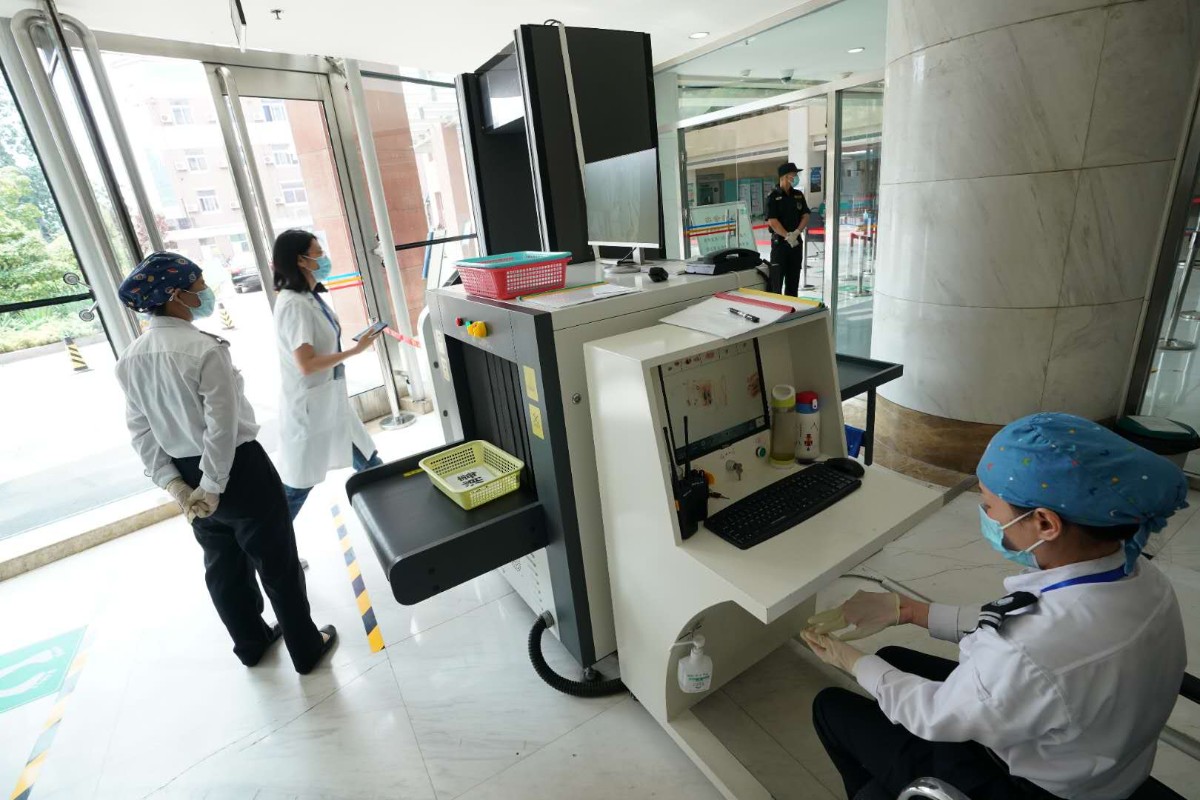
Some people say that the hospital security check may "treat the symptoms but not the root cause." Gentlemen can be prevented, but those who deliberately want to do evil cannot be prevented. The root of conflicts and injuries is that there is no way to resolve the conflicts between doctors and patients. The security check only hides the contradictions but does not eradicate them. However, no matter what kind of contradiction there is, it is absolutely wrong to point a knife at the doctor, and this illegal behavior must be curbed. Even if the security check cannot cure the problem and does not solve the fundamental problem, what is wrong with the "temporary" treatment? Treating the "symptoms" does not hinder the use of other methods to resolve conflicts. Security inspections can stop dangerous goods that may cause harm, and to a certain extent contain the harm, and that's it.
The permanent cure is to cure the root, and the temporary cure is to cure the symptoms. Set up security check measures, if dangerous goods are not brought into the hospital, some injuries can be avoided. The doctor has a minimum sense of security, which is worth it. This is why many deputies and doctors of the National People's Congress have been calling for hospital security checks.
The “Regulations” clarify that for people who threaten to commit violence, go to the hospital for many unreasonable troubles, or are drunk, drug-addicted, or mentally ill patients and other high-risk patients, the hospital should give risk warnings to the relevant medical personnel and be accompanied by security guards until they Leaving the hospital. In other words, the doctor cannot refuse the patient at will. Even if someone threatens violence, he still wants to treat him, but he is accompanied by a security guard. In the face of frequent injuries and illnesses, some people have suggested that a blacklist should be set up so that the hospital can refuse treatment for patients who have committed violent behavior. In fact, no matter from a humanitarian or professional point of view, hospitals will not set up such a blacklist or reject patients. In the eyes of doctors, it is just a patient in need of treatment. What they can do is to use a security check to shut out weapons that may harm medical care. This may cause some minor troubles for many people, but why not support such a small request that is irreversible?
On one side is the "trouble" that can be tolerated, and on the other is the safety of life. We should be able to balance this light and heavy.
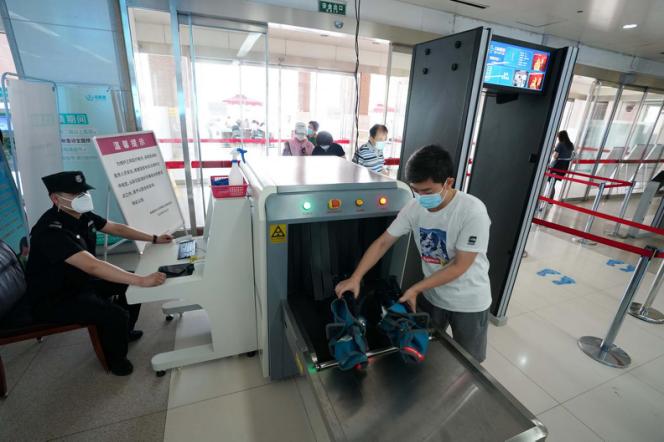
Picture 1: In the outpatient building of Beijing Chaoyang Hospital, patients are passing the smart security screening system
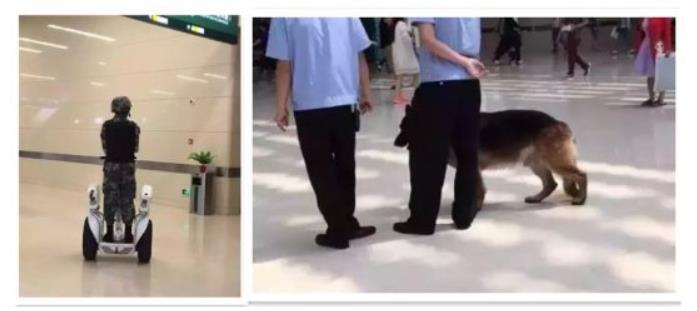
Picture 2: Security guards on duty at the entrance of the emergency room in Tongzhou District of Beijing Friendship Hospital
On July 1th ,2020, Beijing implemented the "Beijing Hospital Safety and Order Management Regulations." The new regulations clarify that hospitals should establish a safety inspection system, conduct safety inspections at the entrance of the hospital or at the entrance of key areas as needed, and strictly prevent prohibited items from entering the hospital.
What changes will the new regulations bring to the people to see a doctor? How do the doctors and patients feel? A few days ago, the reporter walked into some hospitals in Beijing to interview.
The security system is very smart. In addition to detecting metal objects, the security gate also has functions such as face recognition and body temperature detection. It will not cause any impact on some patients with pacemaker implants and pregnant women
On July 10, the reporter walked into the Beijing Chaoyang Hospital affiliated with Capital Medical University and had to pass the "three passes" before entering the door: the first is the registration pass. In the East Gate Plaza of the outpatient building, several patient passages are enclosed. Elderly people without smartphones should bring ID cards and medical insurance cards. Medical staff will help fill out the epidemic and other screening forms. Others will show their health codes and press the one-meter line to enter. . The second is the security check. Two sets of intelligent security screening systems are installed at the entrance, and large packages and small items have to be passed through. The third is manual inspection. If the security inspection system alarms or the security inspector finds an abnormality, manual inspection is required.
At 9:30 in the morning, the reporter saw the digital display on the hospital’s security gate: the number of people passing 1992...
"This door is called a pass-through smart security gate. Unlike ordinary security gates, it can identify and exclude daily metal items such as mobile phones, keys, belt buckles, etc., and only alarm when prohibited items are found, thus greatly improving the efficiency of personnel passing." Bi Tinggang, deputy director of the Security Department of Beijing Chaoyang Hospital, said that this security gate has many functions. In addition to quickly discovering prohibited items, it also has functions such as face recognition and body temperature detection. It will not cause any impact on some patients and pregnant women who are implanted with pacemakers.
It is understood that Beijing Chaoyang Hospital, as a pilot unit, has renovated the entrances and exits of the entire hospital in January this year, and all five open entrances have undergone safety inspections. Security includes physical defense, technical defense, and human defense. According to Li Deling, the hospital’s deputy dean in charge of security work, this set of security gates is only a small part of the hardware upgrade. Since February, the hospital has successively added 20 hand-held metal detectors, 4 metal detector doors, 1 metal detection temperature measuring door, 2 sets of smart x-ray security screening systems, and other equipment to build the first line of security for admission.
In addition to the entrance, the security of each floor and department has also been upgraded. Chaoyang Hospital listed 11 departments including the emergency area, operating room, and radiology department as key departments, and installed intrusion alarm systems; listed various departments in the outpatient building as important areas, including inpatient wards and nurse stations, and installed 115 one-key units. Emergency alarm button installed 27 visual intercom alarm devices and set up face recognition points. "The hospital has achieved full coverage of civil air defense, material defense, and technical defense in key departments, important areas, and public areas." Li Deling said.
In terms of civil air defense, the headquarters of Beijing Chaoyang Hospital is equipped with security personnel, and there is a public security emergency response team. They usually patrol in groups of two.
"It takes half an hour to patrol from the first floor of the emergency room to the tenth floor, and at least 20,000 to 30,000 steps a day." Cui Lei, a security guard, said, he also participates in riot drills every week. This year, the Hospital Security Department has invited instructors from the Anti-Terrorism and Special Patrol Detachment of the Chaoyang District Public Security Bureau in Beijing, and the Hujialou Police Station to the hospital to carry out safety inspections and training on emergency public security incidents.
According to Cao Yongguo, a staff member of the Security Department of Beijing Friendship Hospital affiliated to Capital Medical University, the hospital has set the emergency department, observation room, pediatrics, and doctor-patient office as key security departments, and guards some departments 24 hours a day. The hospital has strengthened skill training simultaneously, has drilled every month, and has security performance assessments every day. Li Yonghong, a security guard on duty in the emergency department, introduced that because the emergency department has a rescue room, there are many emergencies and conflicts are prone to occur. The public security department has also strengthened anti-riot and anti-terrorism drills for the security guards so that the security guards can skillfully use anti-riot equipment.
There are plans for conflicts:
The one-key alarm and central control signals in the hospital directly connect to the police work studio, which improves the response efficiency of the police.
Qu Yuan is a staff member of the Medical-Patient Office of the Tongzhou District of Beijing Friendship Hospital, as well as a neurologist. Long-term handling of the doctor-patient relationship, and participating in the treatment of illnesses, and saving lives, this dual identity allows her to have a deeper understanding of the hospital security work. "The hospital has strengthened the safety training of medical staff, organized online examinations and WeChat online courses, and taught how to use alarm devices."
Not long ago, Qu Yuan encountered a depressed patient. He was very dissatisfied with the results of the examination. He kept making verbal threats and behaved very impulsively. For safety reasons, Qu Yuan judged the timing according to the method taught in the training and decisively used a one-key alarm. The security guard came to accompany him immediately, and the medical treatment process was successfully completed.
Li Xin said that while upgrading security measures, Beijing Friendship Hospital is also committed to improving service attitudes and medical quality. "Any doctor-patient disputes should be discussed in earnest by the department. Issues concerning medical attitudes, responsibilities, and professional ethics need to be submitted to the whole hospital for discussion.
(Keywords: x-ray baggage scanner, walk through metal detector, handheld metal detector, temperature measuring door)